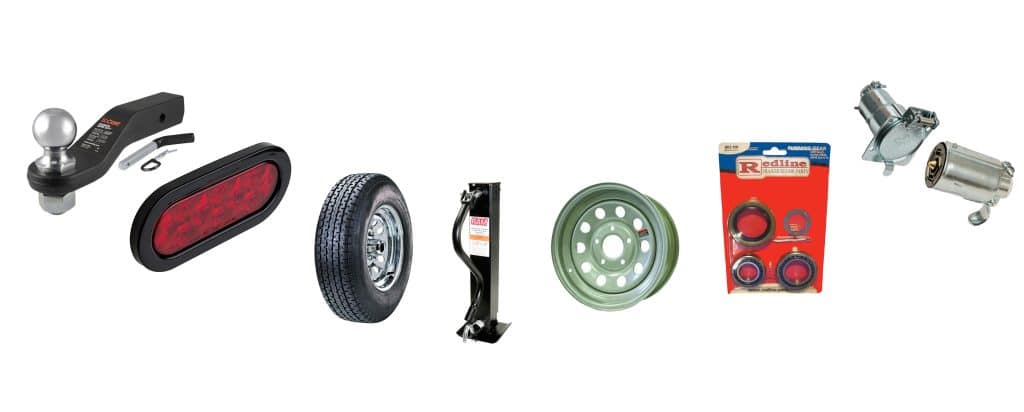Whether you’re hauling goods cross-country or towing a boat down to the coast, your trailer endures a lot of wear and tear. Over time, even the toughest-built components need to be inspected and replaced to keep your trailer safe, legal, and roadworthy. So, what are the parts that most commonly wear out or get damaged?
Here’s a breakdown of the most frequently replaced trailer parts and why they matter.
Trailer brakes—whether electric or hydraulic—are critical for slowing your load safely and legally. Over time, brake pads, drums, or rotors wear out and must be replaced to maintain optimal performance. Signs of brake wear include:
- Delayed stopping response
- Grinding or squealing sounds
- Uneven brake application
Regular brake inspections should be part of your trailer maintenance routine, especially if you’re towing heavy loads or making frequent trips.
Wheel bearings allow your trailer wheels to spin smoothly. When they fail, they can cause serious on-road issues like overheating or wheel lock-up. Bearings often wear out due to a lack of grease or water contamination—particularly common in boat trailers.
To prevent this, seals must be in good condition to keep grease in and water out. Regular maintenance and replacement of these components is key. If you’re sourcing replacements, you’ll find a wide range of trailer parts Melbourne options available to suit different trailer types.
Trailer tyres are built to handle heavy loads, but they don’t last forever. Common signs it’s time to replace them include:
- Uneven tread wear
- Sidewall cracking
- Frequent air loss
Wheels can also bend or warp due to curbing or overloading. Always check your tyre pressure before heading out and keep an eye on wear indicators.
Your trailer’s suspension system—leaf springs, shackles, hangers, and U-bolts—plays a major role in carrying the load evenly. Worn suspension can cause poor ride quality, increased tyre wear, and even structural damage. Replace any visibly rusted or deformed components, especially if the trailer sags or sways more than usual.
Axles bear the brunt of the load and can bend, rust, or crack over time. If your trailer starts pulling to one side or you notice uneven wheel alignment, it may be time for axle replacement. Matching axle weight rating and length is essential when sourcing a replacement.
These small but mighty components ensure your trailer stays connected to the towing vehicle. Frequent hitching and unhitching can cause couplings or tow balls to loosen or wear down, making them unsafe. Check for:
- Rust
- Excess play or wobble
- Difficulty locking in place
Replace them immediately if they show signs of damage.
Lighting is not just about visibility—it’s a legal requirement. Tail lights, indicators, and reflectors often need replacing due to water ingress, vibration, or simple bulb burnout. Wiring looms and connectors can corrode, especially in marine environments. LED lighting can be a longer-lasting replacement option.
Used for manoeuvring and stabilising your trailer when it’s unhitched, these components can bend, seize up, or wear down from rough ground or overuse. Choose the correct load rating and size for your trailer to ensure proper support and easy handling.
Mudguards prevent water, mud, and debris from spraying the road or your vehicle. They’re often damaged by tyre blowouts or impacts. Luckily, they’re one of the easiest parts to replace and come in a variety of plastic and steel options to suit different trailer styles.
These backup safety mechanisms prevent runaway trailers in the event of disconnection. They must be in good condition and correctly rated for the trailer’s weight. Check regularly for corrosion, stretching, or broken links, and ensure your breakaway system is functional if required by law.
Ignoring worn trailer parts can result in:
- On-road breakdowns
- Fines for unroadworthy trailers
- Safety hazards for you and other drivers
Replacing worn components early not only keeps your trailer in good working order, but it also extends its lifespan and helps you avoid costly repairs later on.
From brakes and bearings to lights and landing legs, trailers require regular attention to stay in top shape. Keeping up with replacements ensures you’re not caught off guard by a mechanical failure mid-journey.
Need help sourcing the right parts? Whether you’re a tradesperson, fleet operator, or weekend adventurer, make sure you’re using quality components suited to your load and driving conditions.
